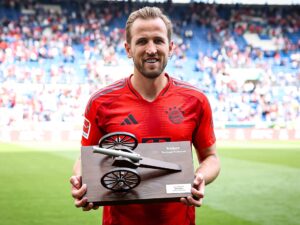Harry Kane made thoughts on Man Utd move clear and attended ‘secret transfer meeting’

During his illustrious tenure at Tottenham Hotspur, Harry Kane steadily rose to become one of the most prolific and admired strikers in European football. His consistent goalscoring feats and leadership on the pitch turned him into a household name across the continent, inevitably drawing the attention of Europe’s elite clubs.
By 2021, Kane had grown visibly frustrated with the lack of silverware at Spurs and took a bold step in trying to engineer a move to Manchester City. In a revealing conversation with Gary Neville during a televised golf game, Kane made headlines by openly expressing his desire to leave Tottenham in pursuit of trophies. It was an unusually candid move for a top-level player and signaled his growing urgency to compete at the highest level. Despite that, a transfer failed to materialize at the time, and it wasn’t until two years later that Bayern Munich swooped in with a £100 million offer, finally prising Kane away from north London.
While Bayern ultimately won the race for the England captain, Manchester United had long been keeping tabs on Kane’s situation. When Erik ten Hag was appointed as United manager, reports from The Mirror suggested that Kane was immediately shortlisted as one of the Dutchman’s top transfer priorities. Ten Hag believed Kane could be the marquee signing to transform his squad. However, at that moment, Kane had other objectives in mind. Rather than chasing an immediate exit, he was focused on writing his name into Tottenham’s history books by overtaking the legendary Jimmy Greaves as the club’s all-time leading scorer.
Moreover, Kane had set a personal standard for any potential exit. If he was going to leave Spurs, it wouldn’t be for a club undergoing a transition or rebuilding phase. He wanted to join a team that could genuinely challenge for major honours from the outset. After he finally surpassed Greaves’ record in February 2023, it appeared the stars might be aligning for a move. Spurs were underperforming, finishing outside the Champions League places, and had just parted ways with manager Antonio Conte amid internal turmoil. Meanwhile, Manchester United had shown signs of resurgence, having clinched the League Cup, reached the FA Cup final, and secured a top-three finish in the Premier League.
At that time, Kane had also declared his ambition to break Alan Shearer’s all-time Premier League goalscoring record, which cast some doubt over whether he would even consider a move abroad. Yet, with Manchester City having moved on by signing Erling Haaland and Liverpool already integrating Cody Gakpo, United were seemingly the only viable English option left.
The scenario was markedly different from the previous year, when United were spiraling. Under Ole Gunnar Solskjaer and Ralf Rangnick, the Red Devils endured one of their worst seasons in recent memory—finishing sixth, amassing their lowest points tally in over three decades, and going a fifth straight season without silverware. Back then, Kane’s desire to leave Spurs was strong, but United didn’t present a compelling enough project. Ironically, Tottenham, under Conte, looked like the more likely team to challenge for honours.
Kane was adamant that his next step had to be one that immediately put him in contention for major trophies. Despite scoring prolifically in what would be his final season for Spurs, the club’s eighth-place finish was the final straw, signaling that his ambitions would never be fully realized in north London. Transfer speculation intensified as reports emerged of a covert meeting between Kane’s representatives and Paris Saint-Germain. According to Foot Mercato, PSG’s sporting director Luis Campos held informal talks about a possible move, as the French giants prepared to usher in a new era by phasing out global superstars like Lionel Messi and Neymar in favour of a younger, more balanced squad.
However, PSG’s transitional state worked against them in this case. The project, much like United’s earlier rebuild, didn’t align with Kane’s immediate ambitions. That left Bayern Munich as the most logical and competitive destination. Encouragement even came from prominent voices within the footballing community—former Liverpool midfielder Danny Murphy wrote in the Daily Mail that Kane should not hesitate if Bayern came calling. Murphy emphasized that a player of Kane’s caliber deserved trophies and would likely regret it if he ended his career without major honours.
Murphy acknowledged that such a move would potentially cost Kane the Premier League goal record, but insisted that glory on the European stage and the chance to win multiple domestic titles should outweigh that individual accolade. He stated: “In five years, we could be talking about Harry Kane, Champions League winner with multiple Bundesliga titles and cup medals. That’s the legacy he should chase.”
Ultimately, Kane took Murphy’s advice—turning down any remaining interest from Manchester United and sealing a blockbuster £100m move to Bayern Munich. Yet, in a cruel twist of fate, Bayern failed to win a single trophy in Kane’s debut season—their first trophyless campaign in over a decade. Nevertheless, the England captain delivered astonishing individual numbers, netting a record-breaking 36 Bundesliga goals and providing eight assists.
Still, persistence paid off. In his second season, under the guidance of new head coach Vincent Kompany, Kane and Bayern bounced back. He racked up an astonishing 38 goals and 13 assists across all competitions, and finally got his hands on a major trophy—his first significant piece of silverware. It was a moment of vindication for the striker who had spent years being doubted for staying loyal to a club that could never quite match his ambitions. Now, as a Bundesliga champion, Harry Kane’s decision to leave Spurs was not just justified—it was rewarded.